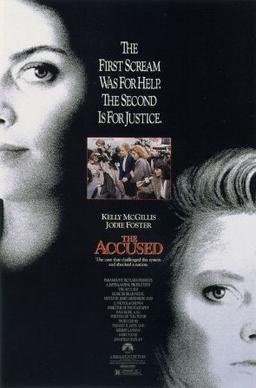
The Accused (1988 film)
The Accused is a 1988 American legal drama film directed by Jonathan Kaplan and written by Tom Topor, loosely based on the 1983 gang rape of Cheryl Araujo in New Bedford, Massachusetts. Starring Jodie Foster, Kelly McGillis, Bernie Coulson, Leo Rossi, Ann Hearn, Carmen Argenziano, Steve Antin, and Tom O'Brien, the film follows Sarah Tobias (Foster), a young waitress who is gang raped by three men at a local bar. With the help of District Attorney Katheryn Murphy (McGillis), she sets out to prosecute the rapists as well as the men who helped induce the assault. Principal photography began in Vancouver on April 27, 1987, and concluded on June 22.
The Accused
- O. Nicholas Brown
- Gerald B. Greenberg
- October 14, 1988 (United States)
111 minutes
United States
English
$13 million[1]
$32.1 million
The Accused premiered at the 39th Berlin International Film Festival, where it competed for the Golden Bear, and was theatrically released in the United States on October 14, 1988. The film was highly controversial upon release due to its graphic portrayal of gang rape. Despite this, it received widespread acclaim from critics, with many praising the performances of the cast and authentic portrayal of its subject matter. It was also a commercial success, grossing $32.1 million worldwide against its $13 million budget, and was chosen by the National Board of Review as the 3rd best film of the year. The film was credited for being one of the first mainstream films to deal with the horrors of rape and its aftermath on a victim's life. Foster's performance marked her breakthrough into adult roles, earning numerous accolades including the Academy Award for Best Actress at the 61st Academy Awards.[2][3]
Plot[edit]
Sarah Tobias is brutally gang-raped by three men at a local bar while several patrons watch and cheer. District Attorney Katheryn Murphy is assigned to the case. Although there is strong physical evidence corroborating Sarah's rape, Katheryn feels that Sarah will not make a credible witness due to her checkered past and flirtatious behavior with the men before her attack. She agrees to a plea bargain, allowing the three rapists to plead guilty to the lesser offense of reckless endangerment, a felony without a sexual offense, and serve nine months in prison. Sarah is angered and feels betrayed by Katheryn's decision, as she wants the chance to tell her story.
Several months later, Sarah is harassed in a parking lot by one of the men who watched and encouraged her rape. In response, she drives her car into his truck, resulting in her hospitalization. Katheryn feels guilty for not giving Sarah the choice to take her case to trial and offering her rapists a plea deal. She decides to prosecute the men who clapped and cheered during Sarah's assault for criminal solicitation. If convicted, the rape will go on record, nullifying the plea deal, and her rapists will serve 5 years in prison.
As the case goes to trial, Sarah is finally able to testify about what happened the night of her attack. Meanwhile, Katheryn pores over evidence and comes across a tape of a 911 call in which a young man reports Sarah's rape. She discovers the caller is Kenneth Joyce, a college student who was present that night at the bar. Reluctant at first, he agrees to testify for the prosecution, recounting how the accused men cheered and goaded the rapists on as they brutalized Sarah. The three men are found guilty of criminal solicitation, and as a result, the rapists will serve additional time in prison. Sarah leaves the courtroom triumphant with Katheryn.
The film closes with a title stating, "In the United States a rape is reported every six minutes. One out of every four rape victims is attacked by two or more assailants".
Themes[edit]
It is loosely based on the 1983 gang rape of Cheryl Araujo in New Bedford, Massachusetts, and the resulting trial which received national coverage (and was also the focus of an episode on the 2020 Netflix documentary series Trial by Media).[4][5] The film explores the themes of classism, misogyny, post-traumatic stress disorder, slut shaming, victim blaming and women's empowerment.